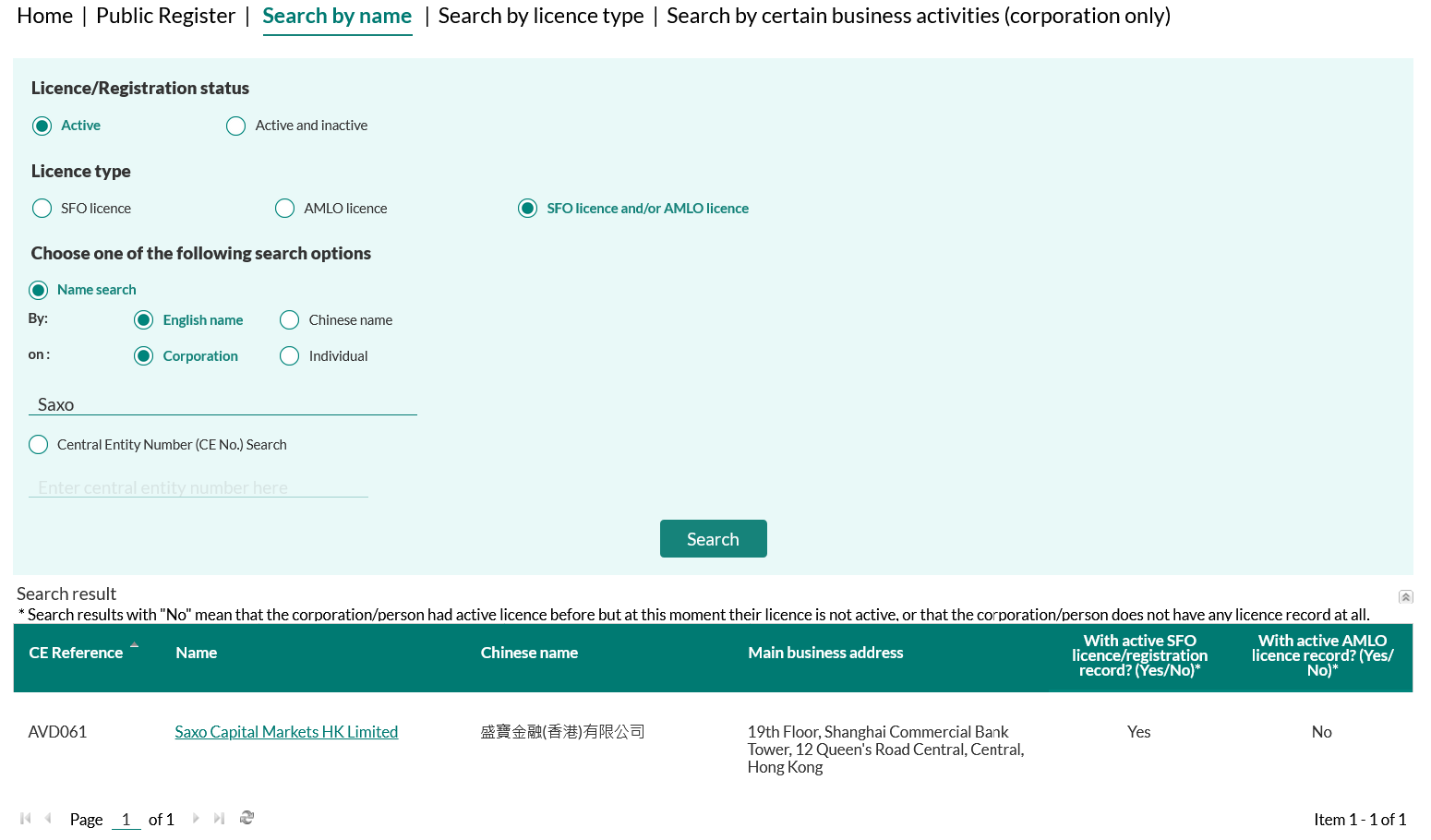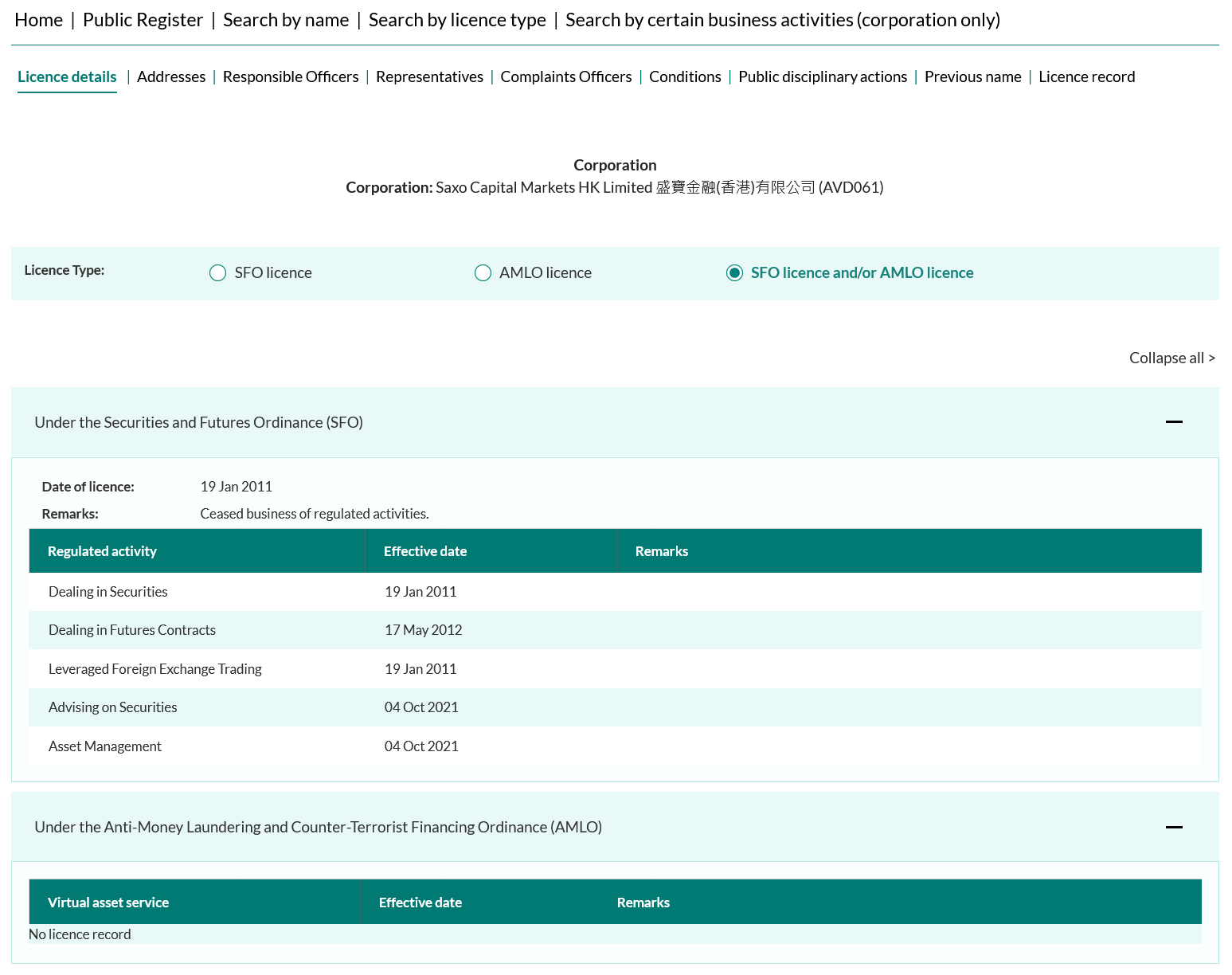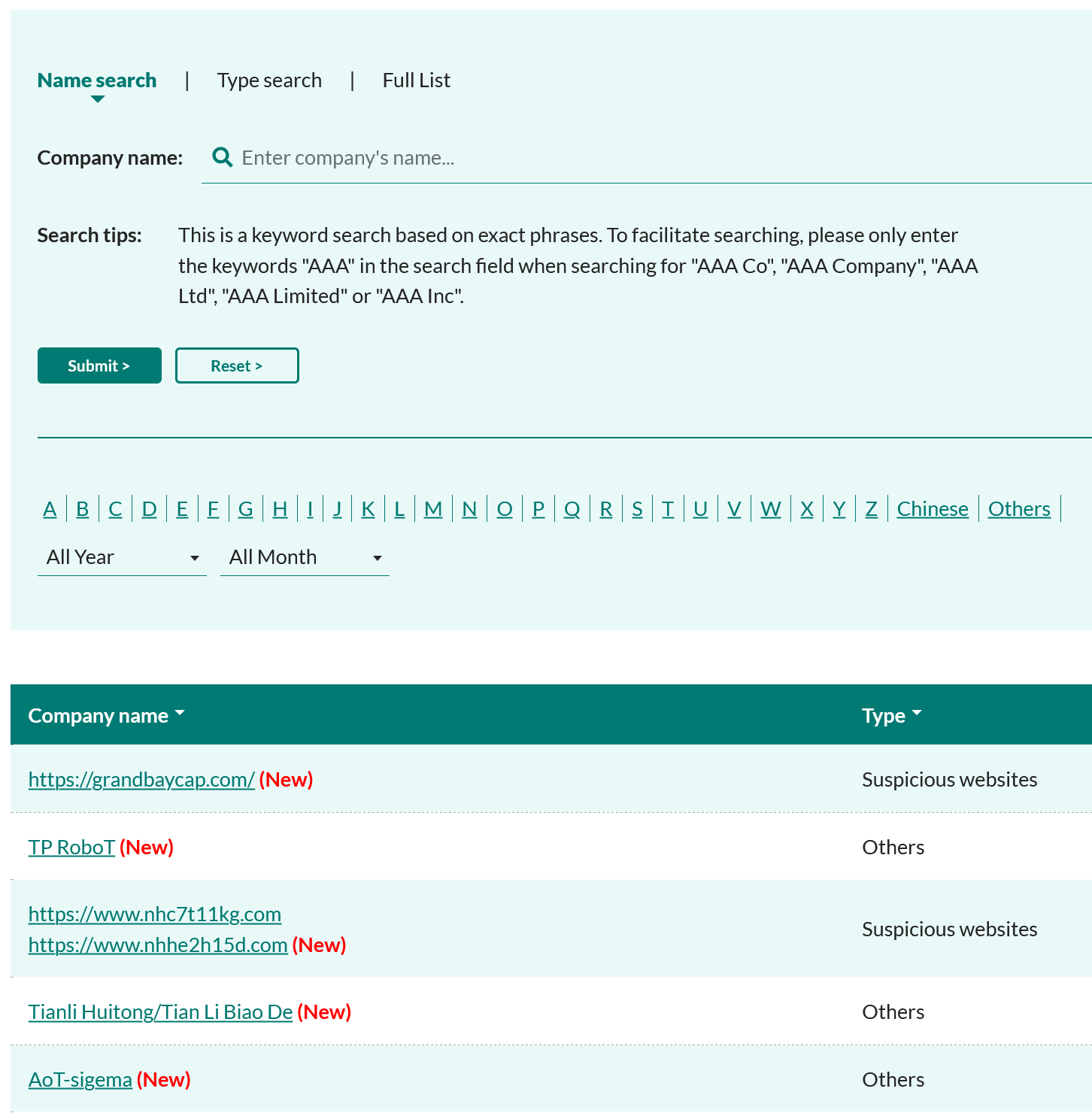Best Securities And Futures Commission Of Hong Kong (SFC) Regulated Brokers 2026
We’ve personally tested and ranked the top brokers regulated by the Securities And Futures Commission Of Hong Kong (SFC), ensuring high standards of trust and reliability.
-
1Interactive Brokers (IBKR) is a top brokerage firm offering access to 150 markets in 33 countries and a range of investment services. With 40 years in the field, this company listed on Nasdaq strictly follows the rules set by authorities such as the SEC, FCA, CIRO, and SFC. It's recognized as one of the most reliable brokers for global trading.
-
2
Trust Platform Assets Fees Accounts Research Education Mobile Support 4.5 NinjaTrader is a US-based brokerage regulated for trading futures. It offers three different pricing plans for varied needs and budgets, along with extremely low margins on popular contracts. The company's renowned charting software and trading platform provides extensive customization options and excellent technical analysis features. -
3
Trust Platform Assets Fees Accounts Research Education Mobile Support 3.4 eToro is a platform for social investing that provides options for both short and long-term trading on stocks, ETFs, options, and crypto. The platform is recognized for its easy-to-use, community-oriented interface and reasonable fees. With oversight from FINRA and SIPC, and used by millions globally, eToro is a reputed name in the industry. Trading on eToro is facilitated by eToro USA Securities, Inc. -
4
Trust Platform Assets Fees Accounts Research Education Mobile Support 4.0 Plus500US, a reputable broker since 2021, is authorized by the CFTC and NFA. It offers futures trading on forex, indices, commodities, cryptocurrencies, and interest rates. With a quick 10-minute signup, a $100 minimum deposit, and an easy-to-use web platform, Plus500 is enhancing its services for traders in the US. -
5
Trust Platform Assets Fees Accounts Research Education Mobile Support 3.7 IQCent is an offshore binary options and CFD broker in the Marshall Islands. It offers various account types with benefits like payout boosts, TradeBacks, and free rollovers. With over 175 assets, 24/7 trading, and 98% payouts, the firm attracts aspiring short-term traders.
Compare Brokers
Safety Comparison
Compare how safe the Best Securities And Futures Commission Of Hong Kong (SFC) Regulated Brokers 2026 are.
Mobile Trading Comparison
Compare the mobile trading features of the Best Securities And Futures Commission Of Hong Kong (SFC) Regulated Brokers 2026.
Comparison for Beginners
Compare how suitable the Best Securities And Futures Commission Of Hong Kong (SFC) Regulated Brokers 2026 are for beginners.
Comparison for Advanced Traders
Compare how suitable the Best Securities And Futures Commission Of Hong Kong (SFC) Regulated Brokers 2026 are for advanced or professional traders.
Accounts Comparison
Compare the trading accounts offered by Best Securities And Futures Commission Of Hong Kong (SFC) Regulated Brokers 2026.
Detailed Rating Comparison
Compare how we rated the Best Securities And Futures Commission Of Hong Kong (SFC) Regulated Brokers 2026 in key areas.
Fee and Cost Comparison
Compare the cost of trading with the Best Securities And Futures Commission Of Hong Kong (SFC) Regulated Brokers 2026.
Broker Popularity
See how popular the Best Securities And Futures Commission Of Hong Kong (SFC) Regulated Brokers 2026 are in terms of number of clients.
| Broker | Popularity |
|---|---|
| Interactive Brokers |
|
| eToro USA |
|
| NinjaTrader |
|
Why Trade With Interactive Brokers?
Interactive Brokers is ideal for seasoned traders due to its robust charting platforms, updated data, and adaptability, especially with the IBKR Desktop application. Its exceptional pricing and advanced order features appeal to traders, and its variety of stocks remains unmatched in the market.
Pros
- IBKR offers exceptional access to global stocks, with thousands of equities available from over 100 market centers in 24 countries, including the recent addition of the Saudi Stock Exchange.
- Interactive Brokers has introduced ForecastTrader, a zero-commission service allowing users to trade yes/no Forecast Contracts on political, economic, and climate events. Contracts offer fixed $1 payouts, 24/6 market access, and a 3.83% APY on held positions.
- There's a large selection of free or paid research subscriptions available to all traders. If you subscribe to Toggle AI, you will also receive commission refunds from IBKR.
Cons
- Customer service may take time to respond, and there may be delays in fixing problems based on tests. It could be difficult to reach the customer service promptly.
- IBKR offers many research tools. However, the tools are not uniformly distributed across trading platforms and the web-based 'Account Management' page, causing confusion for the users.
- Only one active session per account is allowed, which means you can't run the desktop version and mobile app at the same time. This can sometimes lead to a frustrating trading experience.
Why Trade With NinjaTrader?
NinjaTrader consistently satisfies active futures traders with its low-cost service and high-quality analysis tools. It offers superior charting features, including hundreds of indicators and over 10 chart types.
Pros
- NinjaTrader is a well-regarded and acclaimed futures broker, approved by the NFA and CFTC.
- Low costs, with $50 trading margins and commissions starting at $.09 per micro contract.
- You can access thousands of applications and add-ons from developers worldwide for trading.
Cons
- You need to register with partner brokers to trade in securities other than forex and futures.
- Some payment methods require a withdrawal fee.
- The advanced trading tools require an additional fee.
Why Trade With eToro USA?
eToro is a top choice for traders due to its top-notch social investing and copy trading services. The broker caters well to new traders with its low deposit requirement, commission-free trading, and user-friendly platform.
Pros
- eToro USA Securities is a reliable broker that's regulated by the SEC, part of FINRA, and a member of SIPC.
- The low minimum deposit and simple account setup allow beginners to start trading quickly.
- The online broker provides a user-friendly social investment network for easy crypto trading replication.
Cons
- There are fewer trading options available, including only stocks, ETFs, and cryptos, compared to competitors.
- Average fees can reduce the profits of traders.
- Traders used to third-party charting tools won't find MetaTrader 4 platform integration.
Why Trade With Plus500US?
Plus500US is an excellent choice for beginners, offering a user-friendly platform, low trading margins, and access to the Futures Academy to improve trading skills. Its powerful tools and reliable service earned it second place in DayTrading.com's annual 'Best US Broker' award.
Pros
- The trading app offers an excellent user interface with an updated design, straightforward layout, and charts optimized for mobile use.
- The Futures Academy is a useful resource for beginner traders due to its captivating videos and simple articles. Its unrestricted demo account is also beneficial for practicing trading strategies.
- The account setup, pricing structure, and web platform make futures trading simpler than competitors like NinjaTrader.
Cons
- Plus500US offers competitive pricing but does not have a discount program for high-volume traders, unlike brokers like Interactive Brokers.
- Plus500US lacks social trading features, unlike competitors such as eToro US, which might enhance its appeal to aspiring traders.
- Testing showed fast response times for support, but phone aid is not available.
Why Trade With IQCent?
IQCent offers customized binary assets with over 150 products, including 'Hype Pool' contracts that follow trends. It features short-term expiries starting at 5 seconds and payouts up to 95% (with up to a 3% bonus). A TradingView charting package with 100+ indicators makes it suitable for serious and fast-paced traders.
Pros
- New traders with a limited budget can start trading with as little as $0.01.
- IQCent, a binary options broker, provides a copy trading service suitable for traders who prefer a hands-off approach.
- The unique terminal provides TradingView-supported charts featuring numerous technical indicators and studies for traders.
Cons
- The broker is not regulated by a reputable authority, which is typical for binary options companies.
- IQCent lags behind binary brokers such as Quotex, offering a narrow selection of about 175 assets with few stocks.
- IQCent imposes a $10 monthly fee if you don't conduct at least one trade per month.
Filters
How BrokerListings.com Chose The Top SFC Brokers
To list the best SFC-regulated brokers in Hong Kong, we:
- Checked broker registration details in the SFC database.
- Ranked trading platforms using our overall ratings, making use of 200+ data-driven metrics and hands-on testing insights.

What Is The SFC?
The Securities and Futures Commission (SFC) is the body responsible for regulating Hong Kong’s financial markets.
Established in 1989, the organization’s mission statement is “to strengthen and protect the integrity and soundness of Hong Kong’s securities and futures markets for the benefit of investors and the industry.”
The SFC has been designated Category A status under BrokerListings’ regulator rating database. While individual traders in Hong Kong should be vigilant for fraud and poor customer service, this top-tier classification indicates they can trade securities in the territory with confidence.
The SFC is one of four regulators charged with overseeing Hong Kong’s financial services sector. As its name implies, its remit is limited to Hong Kong’s securities and futures markets. The other three bodies are:
- The Hong Kong Monetary Authority, which oversees the region’s banks.
- The Insurance Authority, which supervises Hong Kong’s insurance industry.
- The Mandatory Provident Fund Schemes Authority, which regulates compulsory retirement savings products.
What Powers Does The SFC Have?
The SFC derives its powers from the Securities and Futures Ordinance (SFO), legislation introduced in 2003 to consolidate and modernize existing regulations.
The regulator describes its core responsibilities under the SFO as “maintaining and promoting the fairness, efficiency, competitiveness, transparency and orderliness of the securities and futures industry.”
The SFC’s powers under the legislation include:
- Issuing licenses to intermediaries (such as online brokers and trading platforms) operating in the securities and futures markets.
- Supervising the conduct of individuals and companies, as well as market operators like exchanges, share registrars, clearing houses and alternative trading platforms.
- Authorizing financial products and offering documents for retail investors.
- Assisting other regulatory authorities in Hong Kong, Mainland China and overseas.
- Investigating suspected rule breaches and market misconduct.
The SFC has a range of tools in its arsenal to punish rulebreakers, deter new and previous offenders, and offer remediation to affected parties. For example, it can fully or partially suspend or revoke intermediaries’ regulatory licenses; suspend or remove individuals’ responsible officer status; issue private or public reprimands; and impose financial penalties (up to HK$10 million, or three times the profit gained or loss avoided, whichever sum is higher).
Pro tip: The regulator publishes all enforcement action it carries out (excluding private reprimands) on the Enforcement News section of its website.
As an example, in April 2025, the SFC slapped a HK$4.2 million fine on Interactive Brokers “for regulatory breaches in relation to the handling of client assets” between December 2017 and October 2020.
It ruled that Interactive Brokers had loaned the securities of 7,911 of its clients without authorization. This was caused by a programming error at the brokerage, which impacted the issuance of key renewal documents to clients.
What Rules Must An SFC Broker Follow?
Brokerages must meet strict conduct requirements to receive and maintain regulatory clearance in Hong Kong. Some of the key stipulations include:
- Acting “honestly, fairly, and in the best interests of its clients and the integrity of the market.”
- Assuming “all reasonable steps to execute promptly client orders in accordance with clients’ instructions” and on the best available terms.
- Acquiring “information about [the customer’s] financial situation, investment experience and investment objectives,” and ensuring that “recommendations are based on thorough analysis and take into account available alternatives.”
- Introducing systems to ensure that “client assets are promptly and properly accounted for and adequately safeguarded.”
- Ensuring that “invitations and advertisements do not contain information that is false, disparaging, misleading or deceptive.”
- Establishing “the resources and procedures which are needed for the proper performance of [the firm’s] business activities.”
- Taking steps “to avoid conflicts of interest,” and to “ensure that its clients are fairly treated” when such conflicts cannot be avoided.
- Maintaining “separate accounts for each client for dealings in securities, futures contracts or trading in leveraged foreign exchange contracts.”
- Verifying that staff are “fit and proper” and qualified to act based on professional training and experience.
How Can I Check If A Brokerage Is SFC Regulated?
The SFC offers an online facility that allows individual traders to quickly and simply check a broker’s regulatory status before handing over any cash or personal data.
Using the Public Register of Licensed Persons and Registered Institutions, traders can search for companies using:
Let’s say I wish to check the regulatory status of Saxo. I bring up the register’s ‘Search by name’ option, punch the broker’s title into the relevant field and hit the ‘Search button.’
My query brings up one result, confirming Saxo’s regulatory status and the broker’s CE number, address and license details.

Searching for Saxo using the SFC’s online register. Source: SFC
Clicking on the company’s name gives me more information on the firm, including the types of licenses it holds, the names of responsible officers, and whether it has been subject to public disciplinary actions.

Saxo’s detailed profile on the SFC register. Source: SFC
Pro tip: The SFC also maintains a searchable Alerts list detailing unauthorized providers that have been (or are believed to be) operating in Hong Kong’s securities and futures markets.

A list of alerts published by the SFC. Source: SFC
Pro tip: Use a broker with a HKD account to save on conversion fees if you’re an active trader in Hong Kong.
Bottom Line
Thanks to strict licensing, conduct and reporting rules, the SFC has created a landscape where locals enjoy strong protections from fraud and misconduct.
Though bad actors and unauthorized firms and individuals still operate in Hong Kong, traders and investors can safeguard themselves by using a brokerage that’s listed on the regulator’s online register of licensed companies.
Remember, though, that no regulator provides 100% protection, so individuals should remain vigilant to the threat of scams and other risks.
Article Sources
Securities and Futures Commission (SFC)
Securities and Futures Ordinance (SFO) – Department of Justice
Public Register of Licensed Persons and Registered Institutions – SFC




